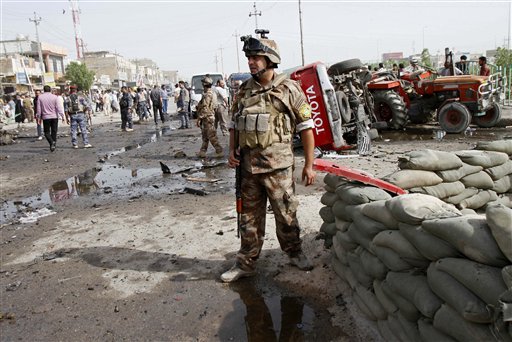(AP) Car bombs in Baghdad, south Iraq kill at least 40
By SINAN SALAHEDDIN
Associated Press
BAGHDAD
A wave of car bombings across Baghdad’s Shiite neighborhoods and in the southern city of Basra killed at least 40 people on Monday, striking at market places and crowded bus stops during the busy morning hours, officials said.
The attacks are the latest in a recent spike of bombings that has hit both Sunni and Shiite civilian targets over the past week. The bloodshed has raised fears of a return to the widespread sectarian violence of 2006-2007 that brought the country to the edge of civil war.
In the Iraqi capital, nine car bombs went off at bus stops, open-air markets and in the streets of Shiite areas, killing 27 people and wounding 116, according to police officials.
The deadliest attacks came in the northern Sabi al-Boor neighborhood and in Baghdad’s eastern suburb of Kamaliya. Seven people were killed in each of those attacks.
In the southern city of Basra, two car bombs _ one near a restaurant and the other at the city’s main bus station _ killed at least 13 and wounded 40, according to the provincial police spokesman, Col. Abdul-Karim al-Zaidi, and the head of city’s health directorate, Riadh Abdul-Amir.
The blast at the Basra bus station ripped through food stalls that serve falafel and eggs to travelers. Slippers lay scattered on the bloodstained pavement.
A Basra resident, Talib Dakhil, said he was at the station when the explosion went off. “This will not discourage us from continuing out life,” he said. “We will continue challenging terrorism, whatever happens.”
No one immediately claimed responsibility for the blasts but such large-scale bombings bear the hallmarks of al-Qaida in Iraq.
Hospital officials in Baghdad and Basra confirmed the casualty tolls. All the officials spoke on condition of anonymity because they were not authorized to talk to the media.
In Baghdad, Malik Ibrahim blamed the government and political parties for the bloodshed and the lack of security in the country.
Tensions have been intensifying in Iraq since the country’s minority since Sunnis began protesting what they say is mistreatment at the hands of the Shiite-led government, including random detentions and neglect.
The protests, which began in December, have largely been peaceful, but the number of attacks rose sharply after a deadly security crackdown on a Sunni protest camp in the country’s north on April 23.
Majority Shiites control the levers of power in post-Saddam Hussein Iraq. Wishing to rebuild the nation rather than revert to open warfare, they have largely restrained their militias over the past five years or so as Sunni extremist groups such as al-Qaida have targeted them with occasional large-scale attacks.
___
Associated Press writer Nabil Al-Jurani in Basra contributed to this report.

COMMENTS
Please let us know if you're having issues with commenting.